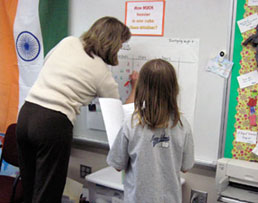Why is Formative Assessment Central to the Inquiry Curriculum?

Formative assessment helps us to become familiar with students’ ideas, helps us to know how their ideas are developing and to plan actions for increasing the development of ideas and skills. Formative assessment also helps children to become familiar with their own ideas and to take stock (and ownership) of how their ideas are progressing. Effective assessment both provides information about students’ learning and helps inform next steps in the learning. In this way, it contributes greatly to learning.
The opportunities for assessment are endless in the Inquiry curriculum. Anytime you observe what children do, listen to what they say, or review what they’ve written and drawn, there is opportunity to take account of their ideas and how these ideas are developing.
However, watching, listening, and reviewing work must be done with specific questions and criteria in mind. In other words, you need to know explicitly what you are watching, listening, and reviewing work for.
Throughout the Inquiry curriculum opportunities for assessment are identified and criteria, questions and guidelines for reviewing students’ work provided as part of the lesson description. These opportunities for assessment are aligned with the goals.
In many cases students are asked to assess their own progress. In this way they will become full partners in their intellectual development and begin to gain internal control of their learning.
Here are some core strategies for using assessment that supports learning:- Be explicit about what is to be learned, i.e., share and talk about the goals with students.
- Have criteria in mind, know what understanding and skill you hope students will develop.
- Share the criteria (or questions) that will be used to indicate progress.
- Provide written feedback with specific suggestions or questions asking for clarification. Avoid using grades and just use written comments when possible.
- Provide ways for students to monitor, and reflect on changes in their understanding, for example, ask what they used to think and what they think now.
* Harlen, W. (2003). Enhancing inquiry through formative assessment. San Francisco: Exploratorium.



